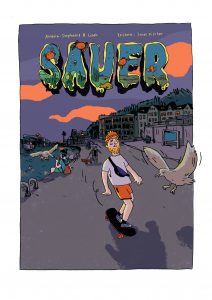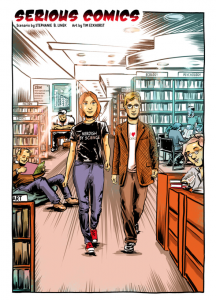Serious Comics for Open Science
Serious Comics for Open Science
Project description
This project is dedicated to our new approach called serious comics. It combines the long-term trends to infotainment, edutainment, and gamification with the rising importance of graphics in Web 2.0 and in science communication. Accordingly, serious comics are understood in analogy to serious games.
According to our definition, serious comics make use of the language of comics for science communication, academic information, and learning. The language of comics is unique in several ways. The combination of words and pictures served a mutual understanding and there are fluent boundaries between words and pictures. For example, the way words are depicted (e.g., shape, size, and color) added surplus meaning (e.g., emotion, loudness). Thereby, in comics words can portray pictorial aspects and pictures can represent verbal aspects.
Serious comics can be seen as a special mixture of linear multimedia instructions or infographics on the one hand and entertaining comics at the other hand. They exploit the entertaining potential (art form) and unique language of comics to make scientific information more appealing with respect to communication and learning.
The idea of using graphic novels in academia is not new. However, until now the approaches are rather pragmatic without scientific foundation. In comparison, our approach of serious comics offers a systematic and scientifically founded view of the use of comics for academia in general including science communication, open science and citizen science as well as educational purposes.
Project activities and prospective research agenda
 In a first step, we described a detailed definition, proposed a systematic classification of serious comics (in relation to other existing approaches), and discussed advantages as well as limitations of serious comics. Based on this theoretical backbone, we explored possible application fields and presented a prospective research agenda. These basic theoretical foundations are described in Linek and Huff’s contribution (2018). Building on this basic framework, the research project “Serious Comics” follows a step-by-step approach to empirically investigate central research questions about serious comics.
In a first step, we described a detailed definition, proposed a systematic classification of serious comics (in relation to other existing approaches), and discussed advantages as well as limitations of serious comics. Based on this theoretical backbone, we explored possible application fields and presented a prospective research agenda. These basic theoretical foundations are described in Linek and Huff’s contribution (2018). Building on this basic framework, the research project “Serious Comics” follows a step-by-step approach to empirically investigate central research questions about serious comics.
The focus of our research agenda is on the optimal use and design of “serious comics” for open science, including science communication and science popularization. Our planned research activities include a corpus analysis of existing materials and related literature as well as qualitative and quantitative empirical studies.
Project results
- Linek, S. B., & Huff, M. (2018). Serious comics: a new approach for science communication and learning. Proceedings of the 12th International Technology, Education and Development Conference (INTED 2018), pp. 3883-3890, 5th – 7th of March, 2018, Valencia, Spain. http://hdl.handle.net/11108/355
- Linek, S. B. & Eckhorst, T. (2021). Serious Comics. ZBW: Kiel (Germany). DOI: 10.5281/zenodo.4692311
- Linek, Stephanie B.; Huff, Markus (2022) : Serious comics for science popularization: impact of subjective affinities and the crucial role of comic figures, In: Proceedings of the 16th International Technology, Education and Development Conference (INTED 2022), 7th – 8th of March, 2022, Valencia, Spain, IATED, Valencia, pp. 517-526. http://hdl.handle.net/11108/518
Project Partners
- ZBW – Leibniz Information Centre for Economics (Stephanie B. Linek)
- Comic Center Kiel (Tim Eckhorst)
Contact
Copyright and trade mark law
The copyright for published graphics, sound documents, video sequences and texts created by ourselves remains solely with us or the respective authors of the pages. Any duplication or use of such objects in other electronic or printed publications is not permitted without the authors’ agreement.
